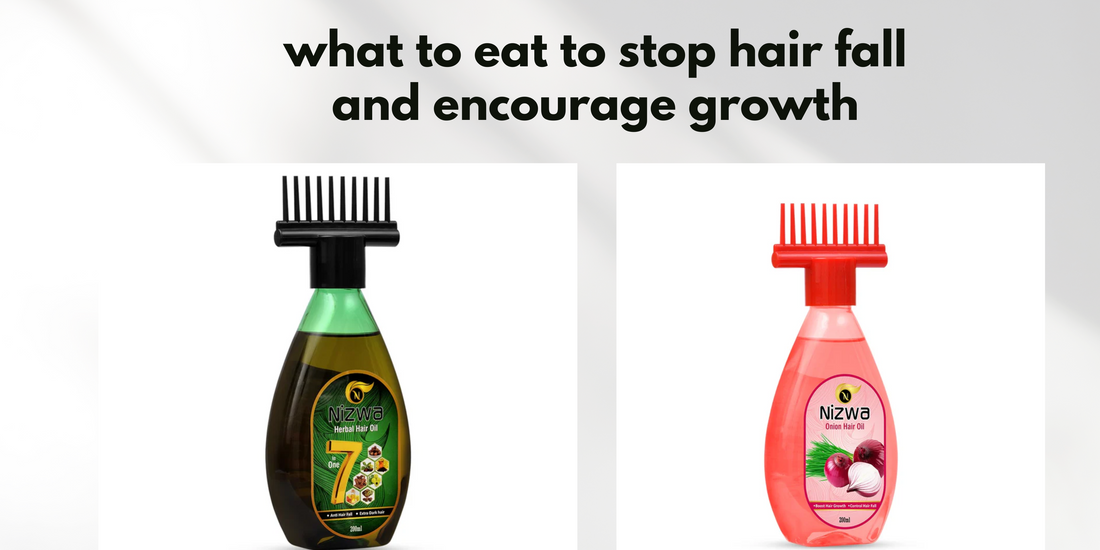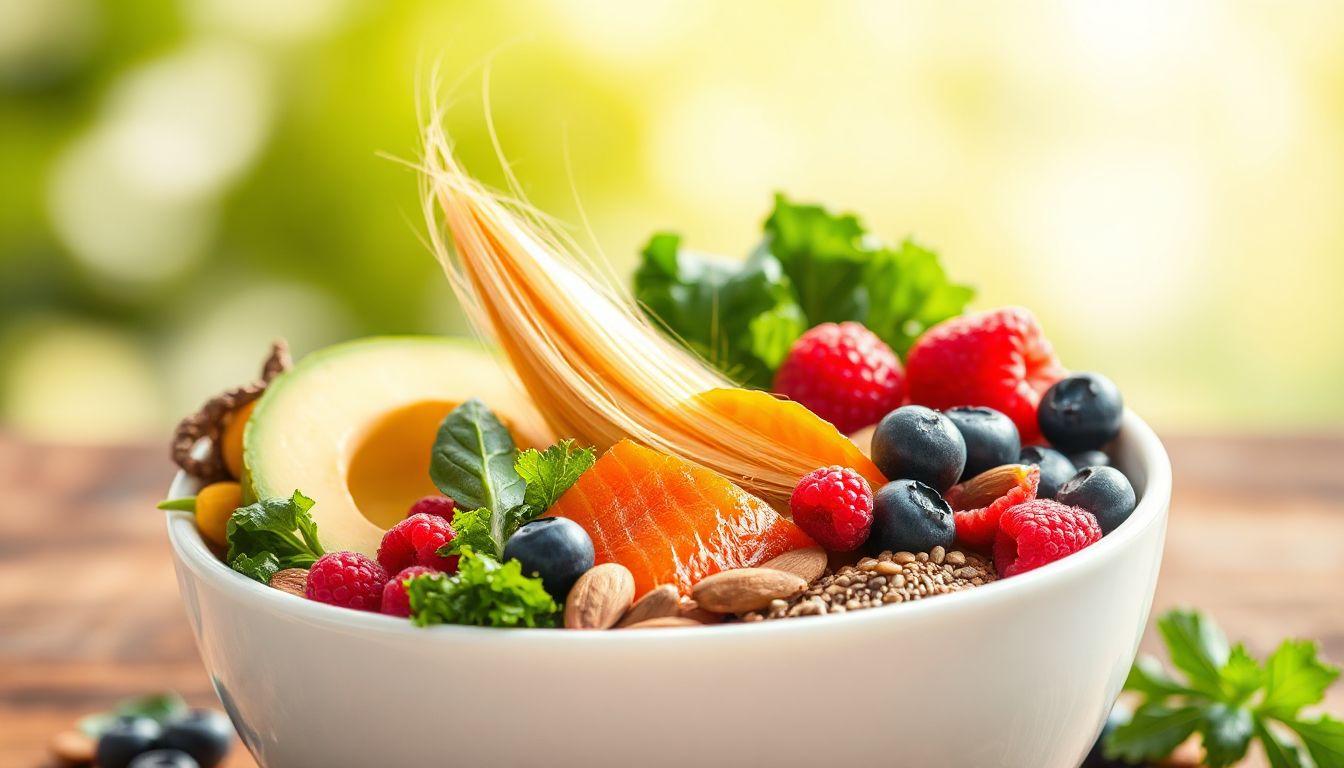
What to eat to stop hair fall and encourage growth Tips
Do you dream of thicker, stronger hair? Feeling worried about strands left in your brush? Many people share this concern, often overlooking a powerful tool: their daily diet. What you eat plays a huge part in your hair's health, from its shine to how much of it stays on your head.
Think of your hair as a garden. It needs the right soil and nutrients to flourish. Hair follicles are tiny factories that constantly build new strands. Without key nutrients, these factories slow down or even stop working right. This can lead to hair thinning, breakage, or more shedding than normal.
This article will show you exactly what to eat to stop hair fall and encourage growth. You'll discover specific foods and nutrients that can help turn your hair dreams into a reality.
Powerhouse Nutrients for Hair Health
| Nutrient | Why It Helps Hair | Best Food Sources |
|---|---|---|
| Protein | Builds strong hair strands | Eggs, lean meats, legumes |
| Iron | Fuels follicle oxygen supply | Red meat, spinach, lentils |
| Vitamin A | Produces scalp oils | Carrots, sweet potatoes, spinach |
| Vitamin C | Boosts collagen, absorbs iron | Citrus fruits, berries, bell peppers |
| Vitamin D | Creates new hair follicles | Salmon, fortified milk, sunlight |
| Vitamin E | Protects scalp cells | Almonds, sunflower seeds, avocados |
| Biotin & B Vits | Speeds growth, nourishes scalp | Eggs, whole grains, leafy greens |
| Zinc | Repairs & protects follicles | Oysters, pumpkin seeds, beef |
| Selenium | Antioxidant for scalp health | Brazil nuts, tuna, whole wheat bread |
| Omega-3s | Reduces scalp inflammation | Salmon, flaxseeds, walnuts |
Key Minerals for Strong, Resilient Hair
Zinc: The Hair Follicle's Best Friend
Zinc is super important for growing and repairing hair tissue. It also keeps the oil glands around your hair follicles working correctly. Not enough zinc can sometimes lead to hair loss or slow growth.
Foods like oysters, beef, pumpkin seeds, and lentils are rich in zinc.
Selenium: Protecting Against Oxidative Stress
Selenium acts as a strong antioxidant. It helps protect your hair follicles from damage caused by harmful molecules. This protection can keep your hair healthier and prevent it from falling out.
You can get selenium from Brazil nuts, tuna, and whole wheat bread.
Omega-3 Fatty Acids: Nourishing the Scalp from Within
Omega-3s do more than just help your heart. They also nourish your hair follicles and calm any inflammation on your scalp. A calm, healthy scalp is the best environment for hair to grow strong and vibrant.
Fatty fish like salmon, flaxseeds, and walnuts are excellent sources of omega-3 fatty acids.
Customer Reviews: Hair Fall & Growth Journeys
Amira
"I added salmon, spinach, and eggs to my diet and noticed my hair fall reduced within 2 months. My hair feels thicker and stronger with the help of Nizwa Hair products."
Ravi
"I was losing hair due to stress. Once I started eating more berries, nuts, and avocado daily, my scalp felt healthier, hair shedding slowed, and Nizwa Hair oil boosted the results."
Huda
"Biotin-rich foods like eggs and whole grains made a big difference. My hair breakage has reduced, and I can finally grow it past my shoulders again while using Nizwa Hair serum."
James
"Switching to a balanced diet with omega-3s and zinc-rich foods worked better than supplements for me. My hair feels fuller after 3 months, especially when combined with Nizwa Hair shampoo."
Important Link: How to know if hair fall is normal or serious
Foods That Fight Hair Fall and Boost Growth
Fatty Fish: Salmon, Mackerel, and Sardines
These fish are superstars for your hair. They pack protein, vital omega-3s, and Vitamin D all in one. People who eat these types of fish regularly often have healthier hair.
Aim to eat fatty fish two to three times each week for the best results.
Eggs: A Complete Package of Hair Nutrients
Eggs are truly amazing for your hair. They are full of protein, biotin, zinc, and selenium. Eating eggs provides a powerful mix of nutrients to help stop hair fall and encourage new growth.
Enjoy eggs daily or almost daily to boost your hair's health.
Berries: Antioxidant Powerhouses for Scalp Health
Berries are bursting with Vitamin C, which is key for making collagen. Collagen makes your hair strands stronger. Their antioxidants also shield your scalp from damage.
Add a handful of berries to your breakfast or enjoy them as a tasty snack.
Spinach and Other Leafy Greens: Iron and Folate Boosters
Spinach, kale, and other dark leafy greens are loaded with iron, folate, and Vitamin A. These nutrients are essential for healthy blood flow to your scalp and strong hair growth.
Make it a point to include spinach, kale, or similar greens in your meals every day.
Avocados: Healthy Fats and Vitamin E
Avocados are more than just delicious. They contain healthy monounsaturated fats and plenty of Vitamin E. These nourish your scalp, keeping it healthy and your hair moisturized from the inside.
Try adding sliced avocado to salads, sandwiches, or even blending it into smoothies.
Nuts and Seeds: A Multitude of Hair-Boosting Minerals
Nuts and seeds offer a fantastic mix of hair-healthy nutrients. Walnuts provide omega-3s, zinc, and Vitamin E. Almonds give you Vitamin E and biotin. Pumpkin seeds are rich in zinc and iron.
Grab a small handful of mixed nuts and seeds for a healthy snack each day.
Hydration and Beyond: Supporting Your Hair from the Inside Out
The Crucial Role of Water
Think about how a plant wilts without water. Your hair can also suffer from dehydration. Drinking enough water helps nutrients travel to your hair follicles, keeping them nourished and active. Proper hydration is a simple step with big results for your hair.
Make sure you drink plenty of water throughout the day.
Gut Health and Hair Growth
New research shows a strong link between a healthy gut and nutrient absorption. When your gut is happy, it's better at taking in all the good stuff from your food. This means more nutrients can reach your hair follicles. A healthy gut truly supports vibrant hair.
Include probiotic-rich foods like yogurt or kefir in your diet to support gut health.
Important Link: What are the 9 reasons for hair loss?
Lifestyle Factors That Complement Your Diet
Stress Management Techniques
Constant stress can push your hair into a resting phase too soon. This can lead to more hair thinning and shedding. This condition, called telogen effluvium, is a real concern. As Dr. Emily Clark, a leading dermatologist, often says, "Our hair is a barometer of our internal health, and stress is a major trigger for hair loss."
Practice stress-reducing activities like yoga, meditation, or even just taking quiet walks to help your hair and overall well-being.
Gentle Hair Care Practices
Even with a perfect diet, harsh hair treatments can undo your hard work. Too much heat, tight hairstyles, or strong chemicals can damage your hair, making it prone to breakage and fall. Be kind to your strands.
Try to limit heat styling and avoid harsh chemical treatments to protect your hair.
Conclusion: Nourishing Your Way to Thicker, Healthier Hair
You've learned that a balanced diet is a powerful tool to stop hair fall and encourage growth. Focus on protein, iron, vitamins A, C, D, E, B vitamins, zinc, selenium, and omega-3 fatty acids. Foods like fatty fish, eggs, berries, spinach, avocados, and various nuts and seeds are your hair's best friends.
Making these smart food choices is a long-term strategy for hair health. Pair good eating with staying hydrated, caring for your gut, managing stress, and gentle hair care. Your hair will thank you with noticeable improvements in thickness and strength. Take charge of your hair health today by making informed decisions about what's on your plate.
FAQs – Foods for Hair Fall & Growth
Q1: Can food alone stop hair fall?
Food plays a major role, but genetics, stress, and medical issues can also cause hair fall. A healthy diet supports stronger hair but may need to be combined with proper care.
Q2: How long does it take to see results from diet changes?
Most people notice improvements in 2–3 months of consistent healthy eating.
Q3: Are supplements better than food for hair growth?
Whole foods are more effective because they provide a natural balance of nutrients. Supplements may help if you have deficiencies.
Q4: What foods should I avoid for healthy hair?
Limit processed foods, excess sugar, and fried items — they can trigger scalp inflammation and weaken hair.
Q5: Is drinking water important for hair growth?
Yes! Staying hydrated ensures nutrients reach your hair follicles and keeps hair strong.


